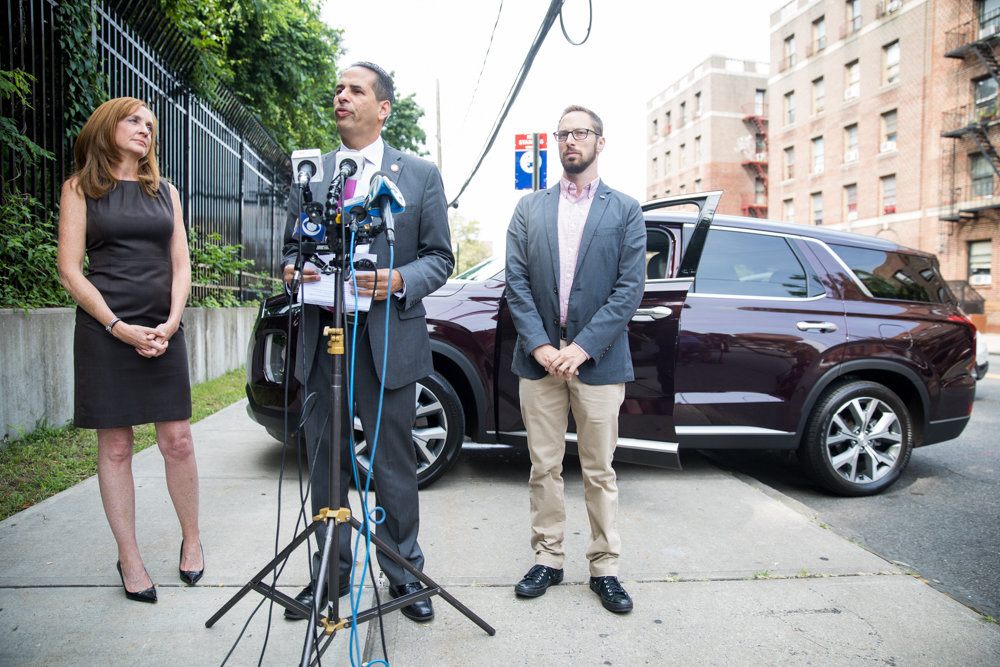Tragedy moves lawmakers to act at city, state level
Leave a dog or cat locked in a car during a heat wave or a deep freeze and face fines of up to $250. Leave a child in the car — so long as the child isn’t injured — nothing happens in New York. At least legally.
Now, more than a week after 1-year-old twins died in the back of a hot car while parked in front of the John J. Peters VA Medical Center, Councilman Fernando Cabrera is ready to change that inequity. Not just at the city level, but state and even federal, too.
“Little Luna and little Phoenix died as a direct result of being left in a hot car,” Cabrera said last week of the Rodriguez twins, just steps from where their father had left them while he worked inside the VA. “It was shocking to believe that though we have sensible laws that prohibits leaving a pet in a car, we don’t have laws that prohibit children being left in a car.”
Last year, 60 animals like dogs and cats died from hot-weather incidents, according to People for the Ethical Treatment of Animals. For children, the numbers are just as bad, according to Sue Auriemma, vice president of the public safety awareness group Kids and Cars.
“What happened last week was not an isolated event,” Auriemma said at Cabrera’s news conference. “The Rodriguez family is not alone. On average, 38 children die a year in hot cars. Last year, we saw 53 children die in hot cars. But this has nothing to do with how much a parent loves or doesn’t love their children. Mr. Rodriguez adores his children. It has to do with the failure of the brain’s memory.”
Because many people already overtax their brains, it’s easy to start to believe we’ve done something — like drop our kids off at the day care — that actually didn’t happen, Auriemma said. The real threat, however, doesn’t come from parents not caring enough for their kids, but instead from parents believing they could never find themselves in the same position as the twins’ father, Juan Rodriguez.
“The biggest mistake is that they can make is that this couldn’t happen to you,” she said. “This can happen to anyone. Over 900 children have died” since 1990.
Prevention comes from being proactive, Auriemma said. It could include something simple like putting a needed item in the back seat that would require you to open the back door and remind you that your kids are there. It could be having day care call parents if children did not show up as scheduled. It’s even buying after-market technology, like a device that can “sense life” in the backseat of a closed car, and alert a driver on their smart phone.
Select Hyundai and Kia vehicles offer technology that will set off a horn alarm if the car detects motion in the back seat after the engine has been shut off and the doors locked.
Hyundai and Kia are the only vehicles that offer such alert systems as standard equipment, Cabrera said, and that needs to change. He’s pushing lawmakers in Washington to pass H.R. 3593, also known as the Hot Cars Act of 2019. Ohio congressman Tim Ryan introduced the bill last June that would mandate all vehicles weighing fives tons or less to be equipped with a warning system similar to what Hyundai and Kia offer by 2021.
The bill, which has just a handful of sponsors — including New York Republican Peter King — is now in committee.
“Since 1990 and until 2018, we have had nearly 1,000 children that have died, and that is inconceivable in this day and age when we have so much technology,” Cabrera said. “We especially call upon the U.S. Senate to finally move it forward because we have children that are dying.”
On Friday, Assemblyman Marcos Crespo and state Sen. Jamaal Bailey announced they were introducing legislation in Albany that would push a bill similar to the one in Washington at the state level.
“The tragic loss of Luna and Phoenix in the Bronx last week has shaken us all to our core,” Crespo said, in a release. “As a parent and legislator, I can’t begin to fathom the pain and suffering of the family. But I can understand that this and similar tragedies could be prevented with existing technology that should be mandated in all new vehicles, alerting drivers of the possible presence of an individual, or even a pet, remaining in the car.”






